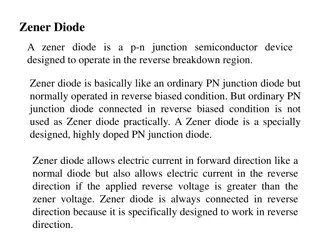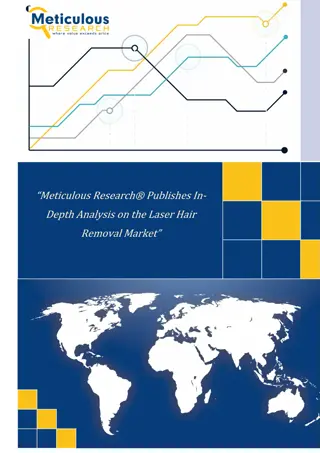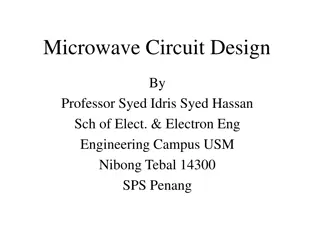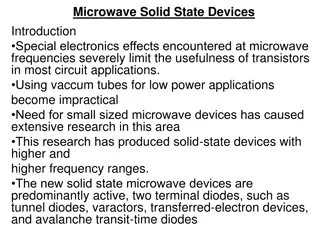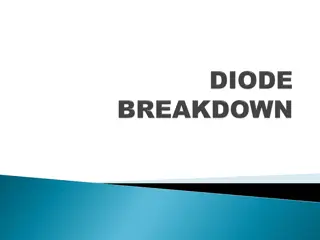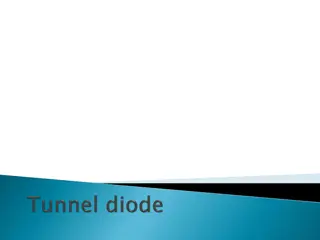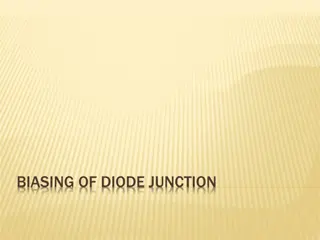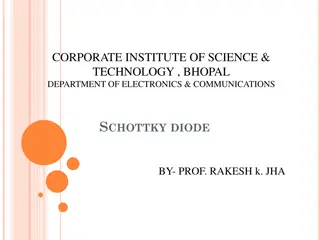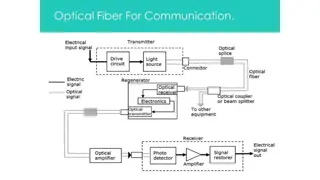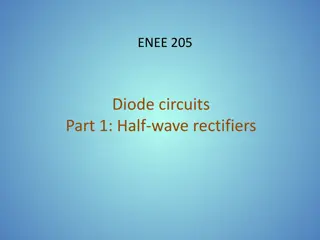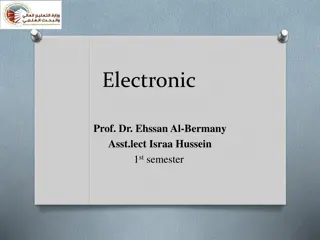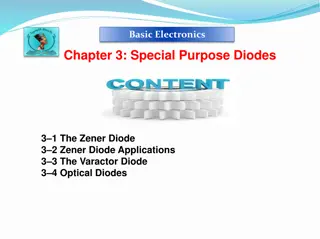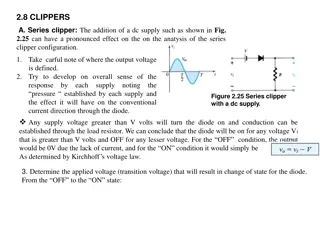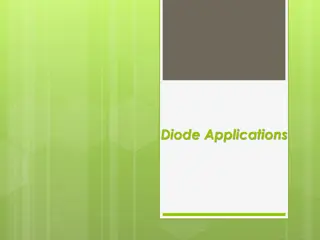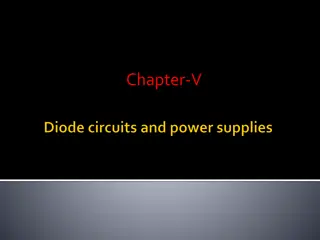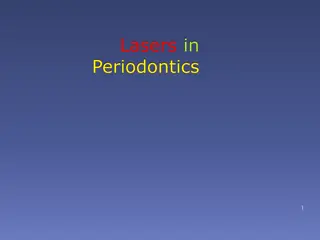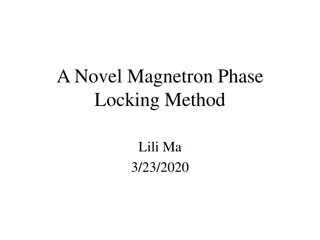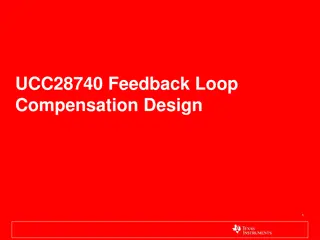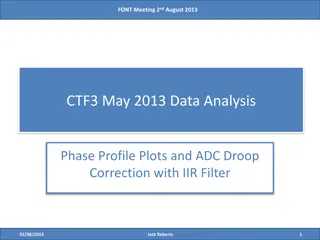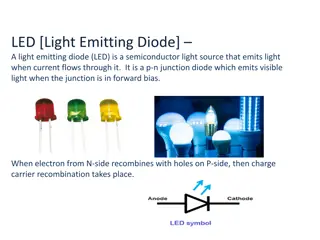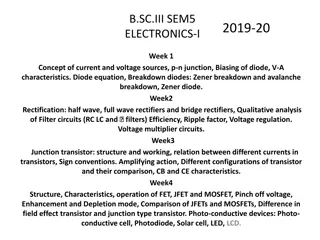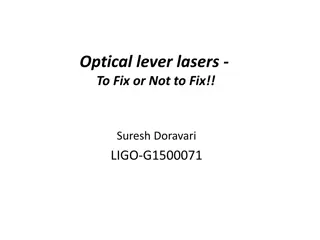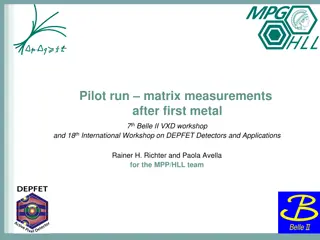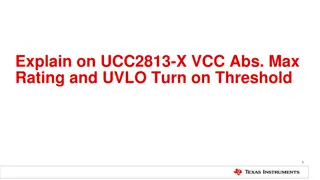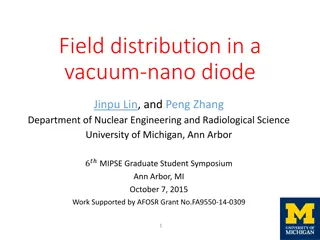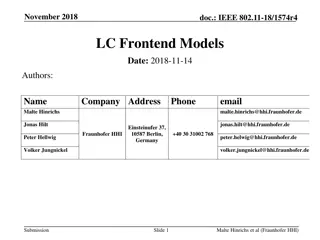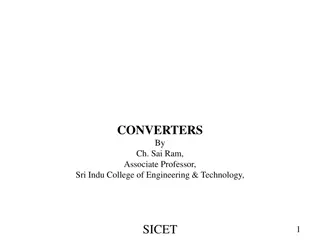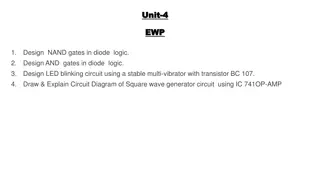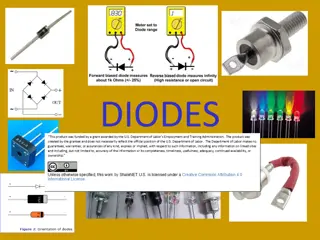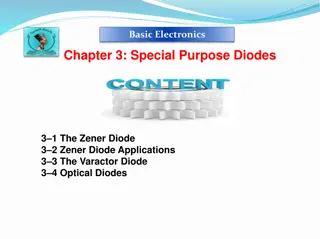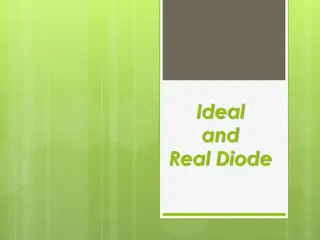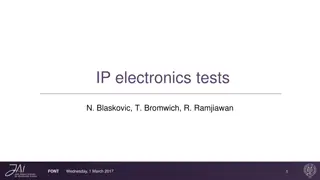Understanding Zener Diodes: Breakdown Mechanisms and Symbol
A Zener diode is a specialized semiconductor device designed to operate in the reverse breakdown region, with two types of breakdown - avalanche and Zener. Avalanche breakdown occurs at high reverse voltages in both normal and Zener diodes, while Zener breakdown is specific to heavily doped P-N junc
9 views • 19 slides
Logic Families
Logic families such as Diode Logic (DL), Resistor-Transistor Logic (RTL), and Diode-Transistor Logic (DTL) each have distinct capabilities and limitations when it comes to performing logic functions. While DL gates are simple and inexpensive but limited in functionality, RTL gates offer both normal
1 views • 22 slides
Meticulous Research® Publishes In-Depth Analysis on the Laser Hair Removal Market
Laser Hair Removal Market Size, Share, Forecast, & Trends Analysis by product (Diode, Nd:YAG, Alexandrite), Wavelength (Multiple, Specific Standard), End User (Hospitals, Dermatology Clinics, Beauty Clinics, Home Setting), Sex - Global Forecast to 2031\n
0 views • 4 slides
Meticulous Research® Publishes Comprehensive Report on the Medical Laser Market Projecting $17.3 Billion by 2031
Medical Laser Market Size, Share, Forecast, & Trends Analysis by Type (Device Type (Solid-state Lasers, Gas Lasers, Dye Lasers, Diode Lasers), Fiber Type (Disposable Laser Fibers, Reusable Laser Fibers)), Application (Device, Fiber), and Geography -
1 views • 4 slides
Comprehensive Microwave Circuit Design Course Overview
This comprehensive course on Microwave Circuit Design by Professor Syed Idris Syed Hassan covers topics such as transmission lines, network parameters, matching techniques, power dividers, diode circuits, amplifiers, oscillators, filters design, and more. The syllabus includes lectures, simulations,
0 views • 49 slides
Understanding Varactor Diodes in Microwave Solid-State Devices
Varactor diodes, also known as varicap diodes, play a crucial role in microwave solid-state devices by offering a much higher range of capacitance change compared to ordinary diodes. These diodes operate under reverse bias conditions, utilizing the variable capacitance effect to manipulate the junct
1 views • 48 slides
Understanding P-N Junction Diodes and Zener Diodes
A normal p-n junction diode allows electric current only in forward biased condition, offering small resistance. When reverse biased, it blocks current. If the reverse biased voltage is highly increased, it can lead to zener or avalanche breakdown. Zener diodes are specifically designed for working
0 views • 19 slides
Understanding Tunnel Diode: A High-Speed Solid-State Electronic Device
Tunnel diode, a heavily doped solid-state electronic device, displays negative resistance due to the phenomenon of Tunneling. It is utilized as a fast-switching component in computers, with germanium being a common material used to manufacture it. The depletion region's width in a tunnel diode is ex
0 views • 15 slides
Understanding Diode Junction Biasing: Zero and Forward Bias Conditions
In the world of electronics, diode junction biasing plays a crucial role. This article delves into the concepts of zero and forward bias conditions for diodes. When a diode is zero-biased, no external potential energy is applied, while in forward bias, a specific voltage is introduced to initiate cu
0 views • 21 slides
Understanding Schottky Diodes in Electronics
The Schottky diode is a semiconductor device known for its low forward voltage drop and fast switching action. Unlike ordinary diodes, it forms a metal-semiconductor junction, resulting in higher efficiency and faster switching speeds. This article explores the construction, working principle, and k
4 views • 11 slides
Overview of Point-to-Point Fiber Optic Communication System
Point-to-point fiber optic communication systems involve converting voice signals from a microphone into digital signals using a coder, transmitting light signals through a semiconductor diode laser over optical fibers, and decoding the signals back to analog for sound production. The system offers
0 views • 11 slides
Evolution of Semiconductor Devices in Modern Electronics
The lecture discusses the fundamentals of semiconductor drift and diffusion currents, diode behavior, transistor characteristics, and amplifier circuits in ECE 255. It explores the origins of modern electronics, from the invention of the bipolar transistor to the evolution of electronic devices thro
0 views • 35 slides
Laboratory for Teaching Laser and Atomic Physics at AAPT Conference
Explore the laboratory curriculum for teaching laser and atomic physics developed by Joseph E. Wiest at West Virginia Wesleyan College. The course encompasses electro-optics, quantum models, optics concepts, laser operations, and experimental objectives. Discover the history and applications of vari
0 views • 41 slides
Understanding Diode Circuits: Half-Wave Rectifiers and Full-Wave Rectifiers
Diode circuits play a crucial role in converting AC signals to DC signals. This article covers the basics of diodes, half-wave rectifiers, and full-wave rectifiers. It explains the functioning of unfiltered and filtered rectifier circuits, highlighting the differences in ripple effects and voltage r
6 views • 18 slides
Understanding Diodes: Basics and Applications
Diodes are essential semiconductor devices consisting of p-n junctions that allow current flow in one direction while offering high resistance in the other. This summary covers topics such as diode structure, forward biasing, and reverse biasing, providing a fundamental understanding of diodes.
0 views • 19 slides
Understanding Special Purpose Diodes in Basic Electronics
Explore the functionalities of zener diodes, varactor diodes, LEDs, quantum dots, and photodiodes in electronic circuits. Discover the characteristics, operations, and applications of these special purpose diodes, including voltage regulation, light emission, and light detection.
0 views • 18 slides
Understanding diode clipper circuits with DC supply impact
Diode clipper circuits, such as series and parallel configurations with DC supplies, have a significant effect on signal analysis. By defining output voltages, determining transition voltages for diode states, and exploring waveform responses, these circuits can be analyzed effectively to understand
0 views • 4 slides
Understanding Diode Applications in Modern Electronic Systems
Diodes are essential semiconductor components with various applications in electronic systems. They allow current flow in one direction, serving as one-way switches. Diodes are used in communication systems, computers, power supplies, televisions, radar circuits, and more. One significant applicatio
1 views • 19 slides
Understanding Diode Circuits and Rectifiers for Power Supplies
Exploring the functionality of diode circuits in series and parallel configurations, along with clippers, clampers, and voltage multipliers. Gain insights into power supplies such as half-wave and full-wave rectifiers, Vrms derivation, Ripple Factor, and more. Learn about diode behavior in rectifica
4 views • 58 slides
Understanding Electronic Components in Circuits
An electrical circuit converts energy while an electronic circuit processes information. Electronic components like buzzer, diode, LED, and LDR play essential roles in circuit operations. Learn about the functions and symbols of these components, including forward and reverse bias in diodes.
1 views • 14 slides
Understanding Lasers in Periodontics: A Comprehensive Overview
Lasers play a significant role in periodontics, offering precise treatment with minimal discomfort. The technology involves light amplification, stimulation of photons, emission processes, and properties of laser light. Classification of lasers based on active medium types is explored, along with sp
0 views • 30 slides
Innovative Approach to Magnetron Phase Locking for RF Applications
This document explores a novel method for phase locking magnetrons, essential for various high-power RF applications. Traditional methods involve injecting RF signals through additional components, leading to complexity and inefficiency. The proposed method utilizes varactor diodes and feedback loop
0 views • 16 slides
Feedback Loop Compensation Design Using UCC28740 for Voltage Regulation
Explore the detailed design and control laws for a feedback loop compensation system using UCC28740 in a flyback regulator schematic diagram. The control law profile in CV mode, multiple control regions, and gain blocks are discussed for achieving high efficiency in voltage regulation. Gain blocks d
0 views • 16 slides
Data Analysis and ADC Droop Correction Meeting Summary
The meeting on 2nd August 2013 discussed phase profiling with unfiltered and filtered mixer/diode, ADC droop correction using an IIR filter, and calibration techniques. Various plots and phase stability analyses were presented by Jack Roberts, highlighting the importance of accurate calibration for
0 views • 27 slides
Understanding the Efficiency and Applications of LED Technology
A light-emitting diode (LED) is a semiconductor light source that emits light when current flows through it. This technology operates based on charge carrier recombination at a p-n junction diode. LED efficiency is calculated as the ratio of light output to electrical input power. Common application
0 views • 5 slides
Advanced Topics in B.Sc III Semester 5: Electronics, Condensed Matter Physics, Nuclear and Radiation Physics
Explore advanced concepts in Electronics-I like current and voltage sources, p-n junctions, diode biasing, rectification techniques, and transistor characteristics. Delve into Crystal Structure and Crystal Diffraction in Condensed Matter Physics, and learn about nuclear forces, radioactivity, and nu
0 views • 24 slides
Enhancing Laser Performance for Precision Instruments
Explore the comparison between diode lasers and He-Ne lasers for optical lever systems, discussing the need for better performance, methods to achieve it, and the impact on precision instruments in challenging environmental conditions.
0 views • 13 slides
Matrix Measurements and Analysis After First Metal Workshop
The pilot run matrix measurements were conducted following the 7th Belle II VXD workshop and the 18th International Workshop on DEPFET Detectors and Applications by Rainer H. Richter and Paola Avella for the MPP/HLL team. The measurements included assessing defects, diode integrity, metal shorts, an
0 views • 30 slides
Understanding UCC2813-X VCC Abs. Max Rating and UVLO
In the UCC2813-X datasheet, the VCC pin has an absolute maximum rating of 12V with a UVLO turn-on threshold of 12.5V for UCC2813-2 and UCC2813-4. The UVLO turn-on threshold can be higher than the maximum rating to protect the Zener diode. To power up the UCC2813-2/4 safely, the external voltage sour
0 views • 5 slides
Electric Field Distribution in Vacuum Nano-Diode
Growing interest in miniaturization of anode-cathode gap using fine emission tips for vacuum nano-diode applications. This study investigates the effects of finite AK gap on electric field distribution around emission tips, utilizing Schwarz-Christoffel transformation. Insights from this research ha
0 views • 16 slides
Proposed Wideband LC Tx and Rx Frontend Models for IEEE 802.11-18/1574r4
Document from November 2018 by Malte Hinrichs and team at Fraunhofer HHI proposing wideband LC Tx and Rx frontend models for channel modeling work of TG 11bb in IEEE 802.11 standard. The document includes detailed descriptions of the frontend models, driver electronics, LED/laser diode configuration
0 views • 17 slides
Understanding Rectification Technologies in Electrical Engineering
Exploring the world of rectification in electrical engineering, this lecture covers the motivation behind using AC to DC conversion, various rectification technologies including electromechanical and diode-based solutions, types of rectification such as half wave and full wave, and practical applica
0 views • 25 slides
Exploring Diode and Transistor Logic Circuits for LED Blinking and Logic Operations
Dive into the world of diode and transistor logic circuits with designs for NAND and AND gates, as well as LED blinking circuits using stable multi-vibrators. Learn how these circuits function and discover the components involved in creating a square wave generator. Explore the practical application
0 views • 9 slides
Understanding Diodes: Construction, Characteristics, and Applications
Explore the world of diodes through detailed explanations of construction methods, electrical characteristics, and V-I characteristic curves. Learn about forward and reverse biasing, diode applications, and diodes used as rectifiers. Delve into alloyed and diffused junctions, PN junction basics, bar
0 views • 26 slides
Understanding Special Purpose Diodes in Electronics
Explore the Zener diode and its characteristics for voltage regulation. Learn about the Varactor diode and its operation. Delve into the features, operation, and applications of LEDs, quantum dots, and photodiodes in electronics.
0 views • 38 slides
Understanding Ideal and Real Diodes in Electronics
In electronics, an ideal diode behaves like a perfect switch with no voltage drop when forward biased and acts as an insulator with zero current when reverse biased. On the other hand, a real diode has a barrier potential and forward resistance to overcome when conducting current. The I-V characteri
0 views • 17 slides
Anomalous IP Processing Electronics Diagnostic Tests
Repeating some anomalous IP processing electronics diagnostic tests on the first stage and the limiter. Tests include checking for unwanted harmonics in the frequency multiplier output and observing changes in the output power with varying input power. Issues with the output of the limiter diode and
0 views • 15 slides
